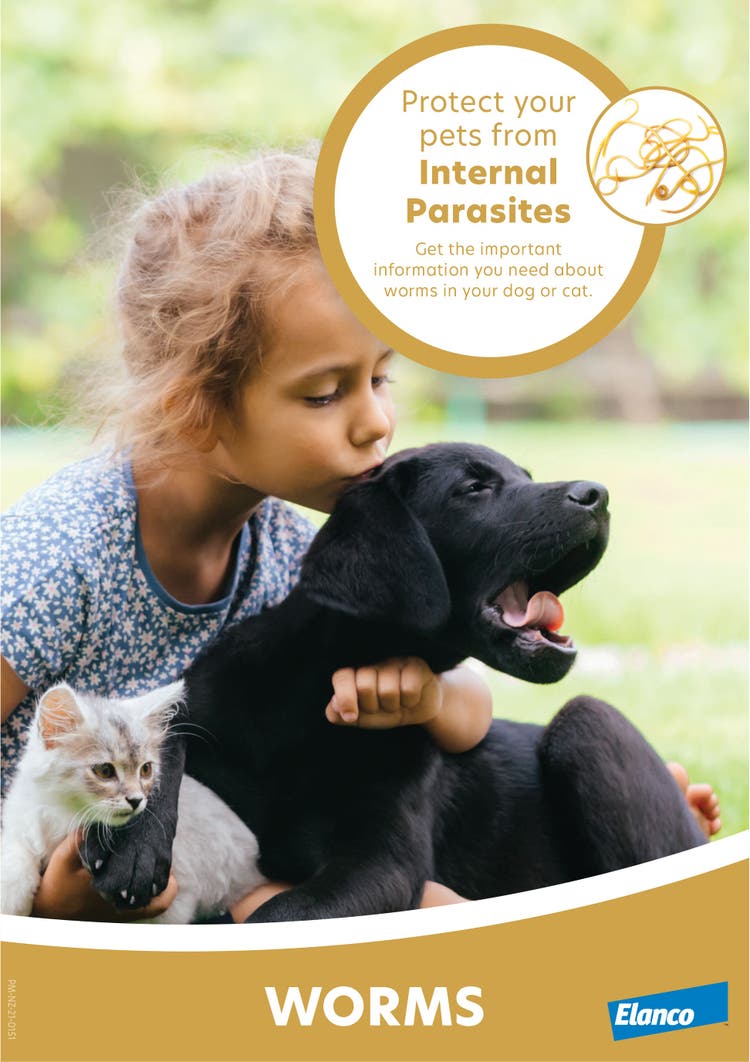Without regular treatment, intestinal worms can pose a risk to you, your family and your pet. Find out more about the most common intestinal worms, including roundworm, common flea tapeworm and hookworm.
Most of us de-worm our pets to save them from discomfort, but it’s also important to de-worm our pets to reduce the number of eggs these parasites shed in soil or dirt because without regular treatment, worm eggs can spread in the environment through your pet’s faeces and can remain infective to other pets and humans for many months or years.
Find out more about the most common intestinal worms, including roundworm, common flea tapeworm and hookworm that you, your family and pet are most at risk of.
Roundworms
Humans can pick up roundworms from a variety of places, so it’s important to know where they are most prevalent and to maintain good hygiene practices to avoid infection.
Here are just a few places you and your family could pick up roundworms from.
Puppies and Kittens
All puppies and kittens are considered infected with roundworms as they are infected through their mother’s milk when suckling. This is why young pets need more regular worming than adult pets.
Children
Children are most at risk of getting worms from the cat or dog, as they’re often in closest contact with your family pets. Children also tend to spend a lot of time outside and can pick up worm eggs from contaminated soil, especially if they don’t wash their hands afterwards.
Unfortunately the cat and dog Toxocara species of roundworm can cause serious illnesses, including blindness, in children.
Pet Waste
Roundworms can cause disease in humans, when we unknowingly eat the microscopic eggs which infected cats and dogs shed in their faeces; by eating improperly washed food, such as salad greens or root vegetables.
Roundworm eggs in the soil can also occasionally stick to your pet’s fur, especially if your dog loves to dig - just another good reason to always wash your dog after a trip to the dog park or when you’ve been hiking.
When infected, pets can shed thousands upon thousands of microscopic roundworm eggs in their faeces, which we can accidentally ingest without realising it. This is why it’s so important to ‘scoop the poop’ after a pet does their business, to avoid these eggs dispersing in both the grass and soil as the stool decays.
Additionally;
- use a bag to collect your pet’s faeces,
- use gloves when cleaning their litterbox,
- keep your garden free of dog poop and
- wash your hands thoroughly after each of the above activities.
Unfortunately, roundworms can also cause vomiting, diarrhoea, coughing and a bloated stomach for our pets, so it’s best to regularly de-worm them to protect them from these nasty parasites.
Common Flea Tapeworms
Common flea tapeworms are long, segmented worms which live in the intestine. Small segments break off and are passed in your pet’s faeces. If your pet has tapeworms, you may see tiny white segments that look like grains of rice slowly moving around in their faeces or stuck to their bottom. These segments are actually packets of tapeworm eggs.
Dogs and cats can become infected with tapeworms by swallowing infected fleas. A tapeworm infection can lead to an itchy bottom, causing your pet to scoot along the ground in an attempt to relieve the itch. Symptoms can also include weight loss and GI upset, though animals often will not show any symptoms at all.
Humans can get tapeworms from their pets in a few ways.
Ingesting Tapeworm Eggs
Humans can become infected with one type of tapeworm, called Echinococcus, if they unknowingly ingest eggs which have been contaminated through a dog's faeces.
Ingesting Fleas
It’s also possible for tapeworms to be transmitted directly from pets to humans; we can become infected if we eat an infected flea by accident, often through playing or sleeping with our pet.
Hookworms*
Hookworms* are thin, short worms with sharp mouths that hook into the lining of the intestine and feed off the pet's blood.
Pets can pick up hookworms by eating the small, worm-like, infective stages found in the soil, or by eating small mammals.
Hookworms mainly affects dogs, and are more common in kennelled dogs like Greyhounds.
* not clinically significant in cats in New Zealand.
Symptoms of hookworms aren’t common in adult cats and dogs, but can be more serious in young cats and dogs, and include diarrhoea, lethargy and anemia.
Here’s how you and your family could come in contact with hookworms.
Contact with Contaminated Soil
If we walk bare foot across an area contaminated by hookworms, the microscopic, infective worm stages can burrow into our skin, causing irritation and itching. Its recommended to wear shoes whenever walking on damp sand or soil to reduce the risk of a hookworm infection.
Hookworms can also affect people. Its recommended to wear shoes whenever walking on damp sand or soil to reduce the risk of a hookworm infection.
Dealing with Worms
De-worming products kill the parasites inside your pet, which then passes in their poop.
Pet owners can choose from a range of de-worming products for their dog or cat including spot-on treatments, such as AdvocateTM for dogs and cats or ProfenderTM for cats and tablets such as DrontalTM, which kill intestinal worms in dogs and cats. De-worm your adult pets at least every three months to control intestinal worms and to help prevent human infections.
Your vet clinic can help you find the right de-worming product for your pet and also help you to set up a regular de-worming schedule to help protect your family, yourself and your pet from these nasty parasites.

Want to read more?
To find out more information about internal parasites (worms) and how they can affect your pet click here to download a copy of our Internal Parasites (worms) Brochure.